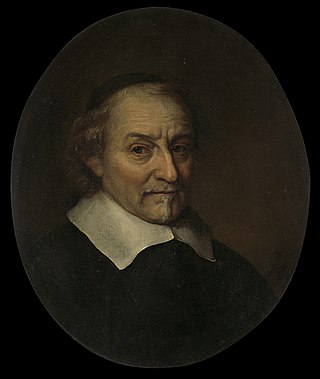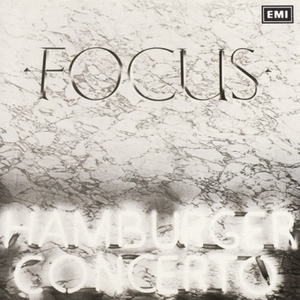
Pieter Corneliszoon Hooft - Knight in the Order of Saint Michael - was a Dutch historian, poet and playwright who lived during the Dutch Golden Age in literature.
This article contains information about the literary events and publications of 1637.

Floris V reigned as Count of Holland and Zeeland from 1256 until 1296. His life was documented in detail in the Rijmkroniek by Melis Stoke, his chronicler. He is credited with a mostly peaceful reign, modernizing administration, policies beneficial to trade, generally acting in the interests of his peasants at the expense of nobility, and reclaiming land from the sea. His dramatic murder, engineered by King Edward I of England and Guy, Count of Flanders, made him a hero in Holland.

Jan Pieterszoon Sweelinck was a Dutch composer, organist, and pedagogue whose work straddled the end of the Renaissance and beginning of the Baroque eras. He was among the first major keyboard composers of Europe, and his work as a teacher helped establish the north German organ tradition.

Joost van den Vondel was a Dutch playwright, poet, translator and writer. He is generally regarded as the greatest writer in the Dutch language as well as an important figure in the history of Western literature. In his native country, Vondel is often called the “Prince of Poets” and the Dutch language is sometimes referred to as “the language of Vondel”. His oeuvre consists of 33 plays, a large number of poems in different genres and forms, an epic poem and many translations of predominantly classical literature. Vondel lived in the Dutch Republic during the Eighty Years' War and became the leading literary figure of the Dutch Golden Age.

Hamburger Concerto is the fourth studio album by the Dutch progressive rock band Focus, released in April 1974. It peaked at No. 20 on the UK charts. The title track is based on Variations on a Theme by Haydn by Johannes Brahms. The composition also incorporates the first two verses of the Dutch Christmas carol O Kerstnacht, schoner dan de dagen at around 15 min. The first track is based on a Gaillarde of Joachim van den Hove of his work Delitae Musicae.

Gijsbrecht van Aemstel is a 17th-century history play by Joost van den Vondel, written to inaugurate Amsterdam's first city theatre. The first production was planned to take place on 26 December 1637, but was postponed until 3 January 1638. The piece was then performed annually in Amsterdam until 1968.

Gijsbrecht IV of Amstel or Gijsbrecht IV van Amstel was a powerful lord in the medieval County of Holland and a member of the Van Aemstel family. His territory was Amstelland, and his son was Jan I of Amstel.

The van Amstel family was an influential dynasty in the medieval Netherlands from the twelfth until the fourteenth century. The family developed the Amstelland and held the stewardship in the ecclesiastical districts in the northwest of the Nedersticht of Utrecht, first in the name of the bishop of Utrecht and later the count of Holland.
Cornelis Thymanszoon Padbrué was a Dutch composer.

De Graeff is an old Dutch patrician and noble family,
Servaes de Koninck, or Servaes de Konink, Servaas de Koninck or Servaas de Konink, or Servaes de Coninck was a Flemish baroque composer of motets, Dutch songs, chamber and incidental music, French airs and Italian cantatas. After training and starting his career in Flanders he moved to Amsterdam in the Dutch Republic, where he was active in circles connected to the Amsterdam Theatre.

Jacob Dircksz de Graeff, free lord of Zuid-Polsbroek was an illustrious member of the Dutch patrician De Graeff family. He belonged to States Faction and was an influential Amsterdam regent and burgomaster (mayor) of the Dutch Golden Age.

Camerata Trajectina is a Dutch early music ensemble.

Johannes Gijsbertus Bastiaans was a Dutch organist, composer and music theorist. Bastiaans was educated in organ playing from the age of ten in Deventer. He studied to become a watchmaker and settled in Rotterdam. There he meet C.F. Hommert, who introduced him to the works of Johann Sebastian Bach.

Antonius Johannes (Antoon) Derkinderen was a Dutch painter, Glass artist, Draftsman and designer of book covers.

Jan Pietersz Graeff was an Amsterdam regent and cloth wholesaler from the 16th century.

Andries Boelens, also: Boelenz, Boelensz., Andries Boel Dircksz. or Andries Boelen Dircksz, was an alderman and mayor of Amsterdam. In the period from 1496 to 1517 he was mayor fifteen times. The term of his office is the first to be characterized as a period with a rather closed government elite. Because of this he was one of the founders of the Amsterdam oligarchy. Boelens is considered the progenitor of the Amsterdam regents of the Dutch Golden Age such as the De Graeff and Bicker families who largely claimed descent and their political legality from him.















